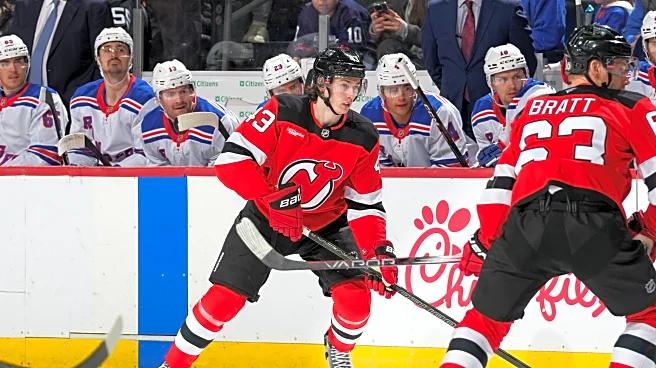Yes, it’s yet another article about Luke Hughes. I get it, we’re all sick and tired of reading, writing, and worrying about Hughes’ future in the Garden State. But the fact remains, Hughes – currently
a restricted free agent – has not officially put pen to paper on a new contract. Until that happens, we must continue to focus on the drama.
Since the end of the playoffs, plenty of rumors have swirled around what Hughes and his camp are looking for. At one point, the hot rumor was that Luke was looking for a five-year deal so he could reach free agency at the same time as his older brother Jack. Last week, James Nichols of NJ Hockey Now speculated that Hughes’ agent, Pat Brisson, is simply trying to squeeze every penny out of Luke’s next contract, regardless of length. He also reported that the Devils are looking to sign the youngest Hughes to either a three-year bridge deal, or a max-term, eight-year extension. Nothing in between.
Before I go any further, I want to make it clear right now: I absolutely want a max-term deal for Luke Hughes. He’s a critical piece of the Devils’ present and future, and an eight-year contract helps keep him in New Jersey for most (if not all) of his best seasons. And I know I’m not alone, as it seems like every other Devils fan in existence wants a long-term deal for the youngest Hughes brother as well.
But while I might want an eight-year contract for Hughes, we have to acknowledge that it’s at least possible general manager Tom Fitzgerald shifts to a short-term bridge deal instead. According to AFP Analytics, they project Hughes would get about $5.75m on a three-year deal and about $8.4m on an eight-year deal. If Brisson gets his way, those numbers could tick up, say to $7m on a bridge deal and $10m on a max-term pact. So while I don’t exactly like it, it might be good to prepare for a potential bridge contract for Hughes.
Is there a case to be made that New Jersey could benefit more from a three-year deal for Hughes over an eight-year deal? Well by god we can sure try. Let’s get into it:
Salary Cap Flexibility
This is of course one of the big benefits of going for a shorter contract for any player. By not committing yourself to a max-term extension, not only do you give yourself an out if the player doesn’t perform well, but bridge deals almost always end up coming in at a lower cap hit than a long-term contract. And in this case, it could mean the difference between dishing out $5.75m-$7m for Hughes or $8.5m-$10m. That’s a big difference, especially for a team like New Jersey who figures to be a cap ceiling team for the foreseeable future.
We’ve talked at length around these parts about moving Ondrej Palat’s contract. We talk about it with Dougie Hamilton to some extent. We talked about it with Erik Haula until he actually got moved. And on the flip side of the coin, we talk about how nice it is to have players like Nico Hischier, Jesper Bratt, and (especially) Jack Hughes on team friendly contracts. The reason we make a big deal out of all these contracts is because every dollar matters in a salary cap league. If a bridge deal for Luke Hughes opens up $3m-$4m more on the books, that’s a big deal that should be appreciated as such.
The Timelines
What timelines? That would be the Hughes boys’ various timelines. Even if there’s truth to the rumor that Brisson and the Hughes camp are looking for a five-year deal to walk both Jack and Luke to unrestricted free agency at the same time, it is WILDLY unlikely that Fitzgerald actually gives in to that demand. It’s something Chris touched on recently, and I agree that there’s just no way Fitzgerald lets it happen.
So if we work under the assumption that Hughes is getting either a three- or eight-year contract, then none of the Hughes brothers will hit free agency at the same time. This is important considering all the talk of the Devils luring Quinn to New Jersey to play with his brothers, perhaps sooner rather than later. We’ve talked about that situation over and over again around here too, so I’ll spare you another rundown. Suffice to say, there’s enough smoke there to be taken seriously, and it bodes well for the Devils that this situation will get some finality soon.
Quinn is set to become a free agent in 2027. Under a three-year contract for Luke, he would get to (restricted) free agency in 2028. And Jack isn’t set to hit the market until 2030. You will notice that none of those years are the same as each other. We all fear Luke and Jack hitting the market at the same time because we’re scared of them leaving and going to another team together. Personally I find it hard to believe that a team would be good enough AND have enough cap space to lure both of them at the same time, but I can at least understand the concern. So a three-year deal would stagger the end of each contract nicely, and assuming Fitzgerald keeps the Devils’ books relatively clean, he can potentially sign each brother to a new contract once they hit the market.
And one more thing about a three-year deal: If New Jersey does, in fact, sign Quinn long-term when his current contract is up, they would then be in a great position to ink Luke to a long-term pact in 2028 when his bridge deal is up. And if both Quinn and Luke are locked in for the long haul by then, it would give Jack every incentive to stick around in New Jersey past 2030 too.
I understand you can stagger the end of each contract with a long-term deal for Luke as well. But in this scenario, the Devils have more cap space and flexibility to play with, making it even more likely they can make a move for Quinn. Again, every dollar matters for a cap ceiling team.
Playing The Long Game
I know it sounds contradictory that going short-term with Hughes’ next contract is playing the long game, but hear me out.
If the Devils are able to sign Hughes to a max-term contract, that would take him through his age-29 season, meaning his next deal would start with his age-30 season. I have to assume that Hughes will not only want another long-term contract at that point, he will also be in a position to receive one, assuming he lives up to his potential. That next contract might be one Fitzgerald and the Devils feel obligated to sign Hughes to, not because of his brothers, but because of his performance and what he would mean to the organization at that point. And as we all know, long-term extensions to players in their 30’s don’t exactly age well. Hughes at 30 would probably be fine. But Hughes at 34, 35, or 36? That’s a different story.
We’re already seeing this play out with Dougie Hamilton, who was a bonafide star in this league at the time of his signing. Fast forward to the present, and a lot of Devils fans want him gone due to how he’s aged. Even if you think Hamilton still has plenty to give (which personally I still do), it’s fair to say he might not be worth his $9m cap hit anymore, and it’s highly unlikely he improves as he gets deeper into his 30’s.
So with Hughes, going bridge THEN long-term might be the move. By signing him to a three-year deal, followed by a seven-year deal (because by the time Hughes would next be eligible for a contract, the new max-term for contract length will be seven), you are getting arguably the best 10 years of his career. He would then hit free agency at 32 instead of 30, which might not sound like a big difference, but it is. At that point, Hughes would probably be open to a slightly shorter term deal, and if he does start to show signs of serious decline, New Jersey might be able to sign him again for far less than if he was coming off his age-29 season. Not to mention the salary cap will presumably have gone up in those two extra years, leaving the Devils with more room to bring Hughes back.
Again, two years might not sound like a big difference. But it could potentially benefit New Jersey a lot if things break right.
What If Hughes Stagnates?
Here is the angle none of us want to think about, but must confront anyway.
Hughes has played two full seasons in the NHL now. His rookie year was quite promising, especially considering how much was foisted upon him thanks to several key injuries that season. He followed that up with a sophomore campaign that, while good, was not superstar stuff. But that’s ok, because he’s still young and no one expects him to be a superstar this quickly!
Except…
While his counting stats are there, and a lot of his advanced numbers look pretty good, there’s one thing that should be a concern about Hughes’ results the past two seasons: He’s been consistently outscored during 5-on-5 play. According to Natural Stat Trick, Hughes was outscored 51-55 in 2023-24, and he was outscored 43-48 this past season. Two things about those figures: First, even taken at face value, those still aren’t awful numbers, so he’s not getting totally caved in. And second, it’s worth noting that his PDO was .988 and .981 in 2023-24 and 2024-25 respectively. This indicates that Hughes’ 5-on-5 goal results are more bad luck than bad play.
But is it bad luck, or is it something else? His other metrics look good (but not great) per NST, so maybe there isn’t that much cause for concern. Then again, if Hughes really is close to exploding into a superstar, shouldn’t his on-ice results reflect that?
Over the summer, old pal CJ Turtoro has been cautioning Devils fans to lower their expectations for Hughes. And while he is far from the gospel on hockey analysis, he does bring up some reasonable points. Namely, a roundup of how various analytics sites measure his value, comparing Luke to his brothers, and how Hughes looks at his age next to other defensemen who went on to become stars. Even CJ isn’t saying Hughes is a bum though, just that we might be overrating him a tad.
So I come back to the question again: What if Hughes stagnates? What if, instead of blossoming into a superstar, he becomes merely a solid top-four blueliner? Well if that’s the case, a bridge deal would absolutely be the best move. Instead of locking Hughes in for a high cap hit that he won’t live up to right out of the gate for eight years, signing him short term at a lower number, then circling back in three years and potentially signing him to a lower AAV than what he might get this season (due to less than superstar production) is in the best interest of the New Jersey Devils.
Hughes failing to reach his potential would obviously not be ideal, but in the event that happens, a bridge contract would help the Devils avoid another problem contract on their books.
Final Thoughts And Your Take
I once again feel compelled to state that I do not want Tom Fitzgerald to sign Luke Hughes to a bridge deal. I would much rather a max-term contract, as I think almost all of us would.
My goal today was not to pound the table for a short-term pact for Hughes. Rather it was to explore some potential benefits to going down this road if it comes down to it. So you can think of this piece as just one big cope session in the event of a bridge deal for Hughes. I don’t even fully agree with the arguments I laid out here, but I do think they are factors that are worth considering at the very least.
Now that I’ve run through the case for a bridge deal for Luke Hughes, what do you think of all this? I’m going to assume the vast majority of you reading this would prefer a long-term deal, but even if you do, which of these arguments do you find the most compelling? Are you concerned with Hughes’ long-term potential at all? As always, thanks for reading!









